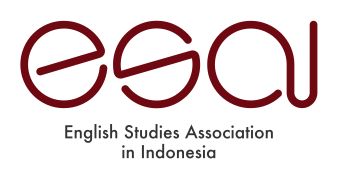Exploring Metadiscourse Use in Thesis Abstracts: A Cross-Cultural Study
Abstract
The use of metadiscourse in academic writing has become a topic of interest in recent years. It can be defined as the words and phrases that writers use in their writing to express their ideas and thoughts to make it easier for readers to process the information presented. It is especially crucial in academic writing since writers are expected to present their arguments in an appropriate and acceptable manner. It has also been said that culture plays a role influencing how arguments and ideas are expressed, especially in academic writing. Although metadiscourse plays an integral role in academic writing, studies have shown how EFL learners often make mistakes in employing this linguistic device. From this, the writer would like to explore the metadiscourse produced by Indonesian EFL learners and compare it with how native speakers of English employ metadiscourse in their writing. In other words, this study is basically an attempt to find out whether the metadiscourse produced by the two groups with different cultural backgrounds are different or similar. The source of data for the current study is the metadiscourse markers from the thesis abstracts of students of the English Language and Culture Department at Bunda Mulia University and American students from a university in the U.S. In order to analyze the metadiscourse markers found in the thesis abstracts of the Indonesian and American students, the writer will make use of the AntConc software version 3.5.6 by Anthony (2018). The result of the study reveals that there are some differences and similarities in the way both group of students employed these markers.
Keywords: metadiscourse, thesis abstracts, Indonesian and American studentsFull Text:
PDFReferences
Anthony, L. 2018. AntConc (Version 3.5.6) [Computer Software]. Tokyo, Japan: Waseda University. Available from http://www.laurenceanthony.net/software
Gholami, J., Nejad, S.R., and Pour, J.L. 2014. Metadiscourse Markers Misuses: a Study of EFL Learners’ Argumentative Essays. Procedia - Social and Behavioral Sciences 98, 580 - 589.
Hyland, K. 1999. Talking to Students: Metadiscourse in Introductory Coursebooks. English for Specific Purposes 18, (1), 3 - 26.
Hyland, K. 2004. Disciplinary interactions: metadiscourse in L2 postgraduate writing. Journal of Second Language Writing, 13, 133 - 151.
Hyland, K. 2011. Academic Discourse. London: Continuum.
Hyland, K. and Tse, P. 2004. Metadiscourse in Academic Writing: A Reappraisal. Applied Linguistics, 25, (2), 156 - 177.
Khedri, M., Heng, C.S., and Ebrahimi, S.F. 2013. An exploration of interactive metadiscourse markers in academic research article abstracts in two disciplines. Discourse Studies, 15, (3), 319 - 331.
Ozdemir, N.O., and Longo, B. 2014. Metadiscourse Use in Thesis Abstracts: A Cross-cultural Study. Procedia - Social and Behavioral Sciences 141, 59 - 63.
DOI: http://dx.doi.org/10.30813/jelc.v9i2.1689
Refbacks
- There are currently no refbacks.



2.jpg)



